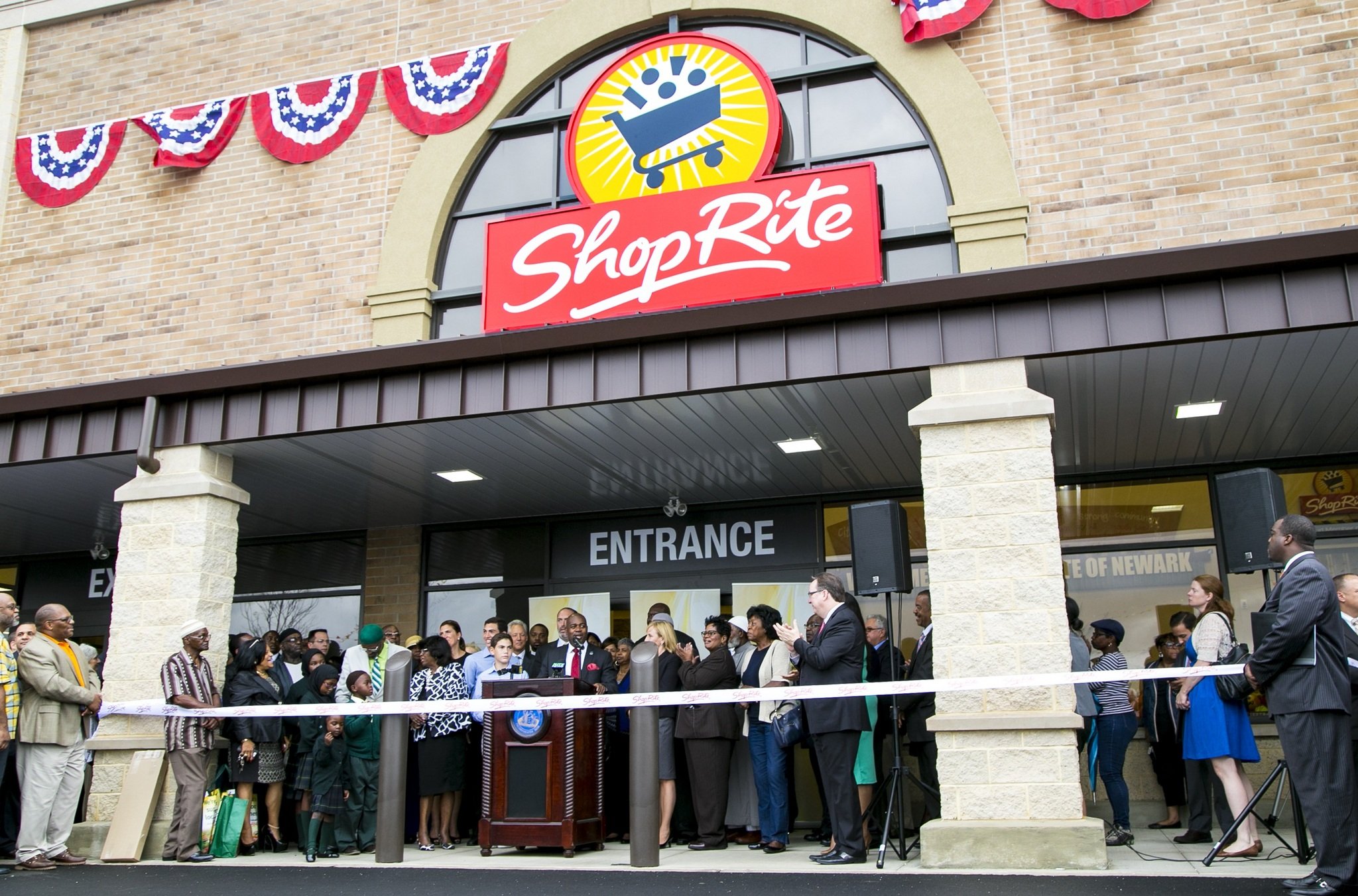
The opening of a ShopRite supermarket in Newark’s Springfield Avenue Marketplace development in 2015 received attention for helping to alleviate the ‘food desert’ crisis faced by Central Ward residents for decades.
“I don’t have to go to West Orange to shop for food anymore,” said Mayor Ras Baraka at the store’s ribbon cutting celebration, explaining that “this is a premiere supermarket that the people of this city deserve.”
Built on a previously gated vacant lot alongside apartments, stores, and restaurants, the ShopRite of Newark was hailed by many as a way to bring fresh foods and employment opportunities to this part of the city, which also included a Pathmark supermarket on Bergen Street at the time. Central Ward Councilwoman Gayle Chaneyfield Jenkins said in a press release that this is “a prime example of how businesses should operate in communities.”
Plus, owner Neil Greenstein told attendees at the groundbreaking event that “my family and I are personally invested in the revitalization of this community,” adding that “the opportunity to serve the Newark community is a natural extension of our 65-year history of service to the people of New Jersey.”
However, one of the steps that was taken to bring a location of one of the region’s largest supermarket chains to Newark has largely stayed under the radar, until now. For months, Jersey Digs has been investigating how the supermarket’s owner ended up receiving $2 million in funding from the City of Newark over a year after the store opened, a detail that was not included in any statements or press releases by officials when the store was developed.
In January 2017, the Newark Municipal Council voted to authorize an agreement authorizing this $2 million grant by the City to be used towards the $13.098 million “fit out and building costs” of the project. The funding was sourced from the Community and Economic Development Dedicated Trust Fund, and stated in part that the City “desires to enter into a grant agreement,” that the project “is vital and in the best interests of the City and that it promotes the health, safety, and welfare of the City’s residents,” and that “the Project qualifies for financial assistance because it is located within a redevelopment area and has been developed for the purpose of implementing the approved Redevelopment Plan.” The term of the grant was ratified retroactively to October 17, 2013, when construction was scheduled to begin.
Although this resolution was adopted in 2017, the plans for the funding by the City to help pay for the creation of the supermarket appear to date back years earlier.
Newark’s Deputy Mayor for Economic and Housing Development, Baye Adofo-Wilson, told Jersey Digs that “the $2 million grant actually came during the prior administration,” explaining that “we sort of just executed it” and “it was there when we got here.”
Cheryl McCants, a spokesperson who represents the City’s Department of Economic and Housing Development, similarly stated that “all of the decision-making and determination around this grant was made several years ago under the prior administration,” and that “the grant monies however, were approved and provided this year to fulfill the City’s obligation.”
However, officials with Senator Cory Booker, who served as Newark’s Mayor prior to Baraka and Interim Mayor Luis Quintana, tell a slightly different story of events. Booker’s New Jersey Press Secretary, Thomas Pietrykoski, said in a statement in part that “the Booker Administration began the review process for this grant, which was completed under subsequent administrations.”
“Financial incentives are used by every level of government to incentivize investment in underserved markets across the nation,” said Pietrykoski, explaining that “the City of Newark used independent financial advisors to study the amount and need for these incentives,” though he was unable to identify the advisors since he was not part of the administration at the time.
At a recent media availability in Newark, Booker told Jersey Digs that he did not remember all of the details regarding the grant, but said that “I’m actually psyched about the success of the ShopRite,” calling the supermarket ‘a glorious opportunity for our city in terms of being in a food desert and having so many people employed.”
“We were able to come up with a deal that was very hard to put together” said Booker, who mentioned that “the capital stack was very complicated and it seemed very challenging ultimately to get the thing together.”
In addition, the resolution stated that “the entity [Newark ShopRite, LLC] was faced with a significant funding gap in connection with the project that must currently be bridged in order to make the project financially feasible,” but when asked whether the supermarket would have opened had it not been for the grant, Baraka said that “I think they would have come.”
“Businesses get grants all the time,” said the Mayor, who went on to explain that he believed that the grant was in connection with the wellness portion of the supermarket.
This is not the only form of public assistance that the Springfield Avenue Marketplace project has received. In 2013, The Star-Ledger reported that the developer of the complex, Illinois-based Tucker Development, “was awarded more than $38 million in bond funds and tax breaks” by the New Jersey Economic Development Authority under the Urban Transit Hub program, the Economic Redevelopment and Growth Grant program, and City redevelopment bonds.
Karen O’Shea, a spokesperson for ShopRite’s parent organization, Wakefern Food Corporation, stated in part that “we are proud to be part of Newark’s dynamic and growing economy,” and that “as an incentive for developing a store at the site, we secured a grant from the City of Newark toward the construction and opening of our full-service supermarket.” However, a subsequent question about the project’s “significant funding gap” went unanswered.
Plus, attempts to reach Greenstein and Councilwoman Gayle Chaneyfield Jenkins, who co-sponsored the resolution, went unreturned, and the other co-sponsor, Councilwoman Mildred Crump, said that she did not remember the details of the grant.